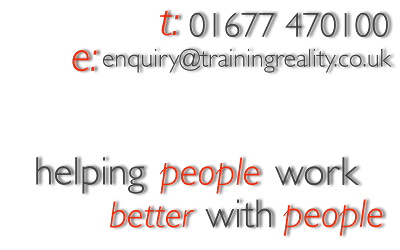Please press (at least!) one of these.
It costs you nothing, and (possibly) helps us spread the word!
Conversational reframing
Monday, 22 February 2010
One aspect of politics that is becoming ever more prevalent, particularly in the run up to the general election, is what NLP refers to as "reframing". In its simplest terms, this involves subtle (or not so subtle) changes in language in order to evoke different responses.
Last week, the example that stuck out for me was the debate around how to pay for care for the elderly in the future. One idea (from the Labour Party) was a compulsory charge of around £20,000 to be taken from a person's estate after death. This was very quickly "reframed" by the Conservative party as a "Death Tax".
Of course, reframing in this way is not the exclusive preserve of one party or another. One of the longest running ones still playing out is Gordon Brown’s reframing of government spending as ‘investment’ – as an attempt to drive a positive perception of what his government is doing.
This type of reframing is driven exclusively by a desire to manipulate our reactions to things – the underlying facts are not changed one iota, but our perception of them is supposed to. Think about how your reactions might be different to the following statements and descriptions:
- Government spending is rising / The Government is increasing investment
- A fee to pay for free care for the elderly / A tax on dying
- He’s very inexperienced / He’s young, dynamic and fresh
- He’s very experienced / He’s part of the old establishment
- Global warming / Climate change
- The Millennium Dome / The O2 Arena
Politicians, advertisers, marketeers – reframing is something that they do day in, day out, and it can be highly effective. I would guess that most people under 40 in the UK have never heard of Windscale, but many more will have heard of Sellafield. I vividly remember the period in the lead up to the Good Friday agreement in Northern Ireland – Sinn Fein was consistently framed as ‘Sinn Fein IRA’ by the loyalist movement. Many, many more examples are available, as they pour at us every day.
The underlying point is that shifts in the language we use to describe something has the power to adjust the way we, and others, think about things. At a very fundamental level, I discussed this here, and, as a recent report on the decline in the number of spoken languages in the world argued, the loss of language range can have direct impacts on the range and flexibility of our thinking.
However, at a much more basic level, how can we use reframing in a positive way in business? How can managers and leaders use this technique to positive effect? The steps are quite simple:
Understand the situation
Because we are trying to broaden the possible descriptive range available to us, the first step is to gain the fullest possible understanding of the reality of the situation.
Add variety
Make a deliberate effort to see the situation in different ways. "If I were excited about this, I’d say…"; if I were pleased about this, I’d say…". Imagine how other people, particularly those your admire, might describe it.
Get help
It can often be incredibly useful to enrol others in this process. Being open-minded to the perspectives of others can help broaden your own views.
Test
If possible, test out different options on people likely to have different perspectives. Is there a manager (or anyone else) in a different department who you could test for reactions with?
--
Reframing, although it is often used and positioned as a tool of manipulation (and think about how you frame the word ‘manipulation!) can be an exceedingly positive thing. Use it first on yourself, and discover the different perspectives and insights it offers.
Please press (at least!) one of these.
It costs you nothing, and (possibly) helps us spread the word!



